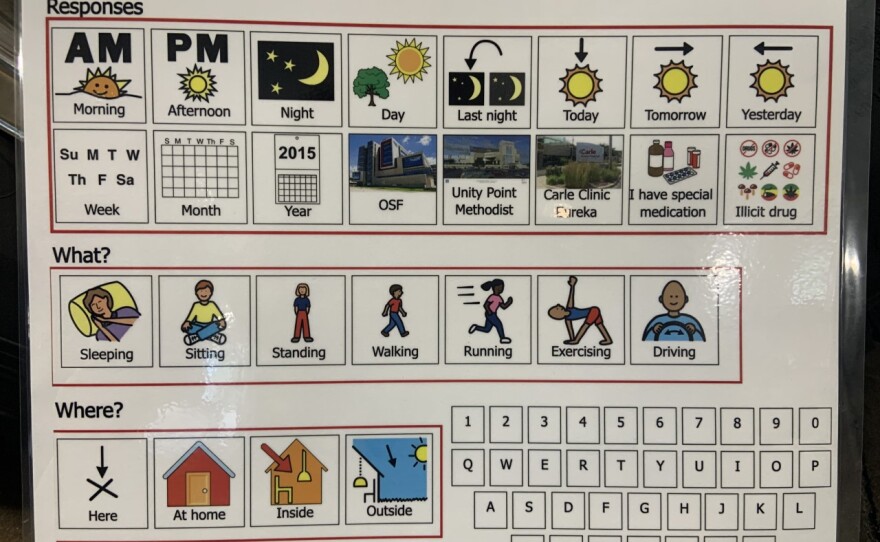Communication is key, especially in medical emergencies, but when a patient has a disability affecting their speech or can't communicate because of a sudden medical crisis, first responders have trouble finding out the best way to help the patient in need.
The Peoria Area Speech-Language Hearing Association, or PASHA for short, is partnering with Advanced Medical Transport and the Peoria Area EMS to create more than 200 Augmentative and Alternative Communication Boards for emergency responders.
Matthew Jackson is the medical director for the Peoria Area EMS with OSF Healthcare. Jackson said it is vital that first responders can piece together what patients are experiencing when an ambulance arrives.
Without proper communication, Jackson said first responders are left guessing what is wrong, and he said this can lead to mistreatment, a delay in treatment and delays in the emergency room.
Jackson said these boards allow patients to point to symbols describing what happened and what help they need.
“If we’re out on scene and we have a device like this that give us at least a rudimentary perspective of what is happening with that patient at that time, we can help not only start that treatment in a much more timely fashion but also keep it going when we reach an emergency department and get them more definitive care,” Jackson said.
Jackson says Peoria AMT and EMT responders will begin using these low-tech boards this week.
“Oftentimes, we’re called for very nebulous calls like a sick person, a person unwell, a person down, all these different types of calls. Sometimes we have a car wreck that we may have someone who is speech impaired or doesn’t have an ability to communicate. Being able to connect with them and really trying to figure out what’s hurt, what the problem is … is really important. Really, minutes can matter,” Jackson said.
“My hope is this would provide them an opportunity to get quick information from their patients on site to help respond to their needs more quickly and to reduce the errors that could happen by not having accurate information, that they would get quick and accurate information so they can respond to it."PASHA board member Carrie Kerr
PASHA board member Carrie Kerr said these low-tech boards won't just help people with hearing challenges in emergency situations.
“A lot of times when people are hurt or having a medical emergency, if they’re dealing with that pain or crisis, language may fall by the wayside, and it might just be because of trauma and stress, or it might be that they had a head injury or a stroke, and they’re finding themselves at a loss for verbal communication,” Kerr said.
“There are also patients out there who just naturally have a lower nonspeaking baseline, and so if those people found themselves in an emergency situation, they need to have a way to communicate as well," Kerr continued. "So, people with autism, people with cerebral palsy who maybe use communication devices to communicate but they wouldn’t necessarily have them with them at the scene, this will allow them to communicate in those situations.”
Kerr says she is hopeful these boards will give first responders the chance to respond quicker to people who may be struggling to communicate.
“I would hope that this is a big step. I think educating everybody at large, so those emergency medical responders, on how to use communication systems when they would be needed and how useful that they are is a great first step to even knowing ‘oh, this might be somebody that I need to consider presenting an alternative form of communication to,’” Kerr said.
Kerr said resources like the AAC low-tech boards are lacking, and PASHA, AMT Peoria and Peoria EMS had to create these boards “from scratch.”
“My hope is this would provide them an opportunity to get quick information from their patients on site to help respond to their needs more quickly and to reduce the errors that could happen by not having accurate information, that they would get quick and accurate information so they can respond to it,” Kerr said.




